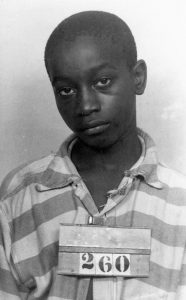Kalief Browder, an African American sixteen year old from the Bronx in New York City, was walking home from a party with his friend when he was stopped by police unexpectedly and charged with an alleged theft in 2010. The accuser, Roberto Bautista, was sitting in a police squad car and identified Browder and his friend as the thieves. The theft was a backpack that was said to contain $700 dollars, a credit card, and an iPod Touch. In his interrogation, with police, Kalief Browder insisted that he had not robbed anyone and that neither the backpack nor its contents would be found in his possession. Browder and his friend were then taken to the precinct where they were processed and taken to central booking. Within the following 48 hours Browder was interrogated and charged with robbery, grand larceny, and assault. At arraignment, bail was set at $3,000 dollars. If Browder’s family used a bondsman the amount would be ten percent plus fees or around $900 dollars for his bail to the bondsman. The bondsman would then post the entire bail amount with the court. The family could not pay $900 resulting in Browder remaining imprisoned at Rikers Island for the next three years.1


Debtors jail in colonial America was used to lock up those who owed money to the government. In today’s society, it translates into the cash bail system. 4 The for-profit bail system in the United States is used to keep those who are accused of breaking the law from harming anybody else or to be sure the accused will appear in court. If the accused is unable to pay the bail at the time of the arraignment, they may use a bondsman or they will remain incarcerated until their trial. For the poor, it is the latter. For Kalief Browder it was the beginning of the end. Only two countries in the whole world have a cash bail system, the United Sates and the Philippines. The cash bail system results in unnecessarily imprisoning citizens who do not pose as a threat to society and who most likely are not a flight risk. No pre-trial information is given to a judge before setting bail and there are no set standards on setting the amount for bail per case.5 Those who are wealthy enough to pay avoid the scarring effect prison has on one’s life. But for those who cannot afford bail, they face violence behind bars, debt, isolation, and at minimum a harsh punishment for those later found innocent, as in Kalief Browder’s case. This has created a two tier system in our judicial process. The first tier are wealthy offenders who can post bail and the second tier is everyone else who cannot afford equal justice or treatment.
Statistics show that 60 percent of people in jail from 2005 to 2015 were in jail awaiting trial. Three fourths of these individuals were accused of nonviolent crimes.6 This is alarming. On a national level, the United States imprisons persons who are essentially living in poverty and who are more susceptible to being involved or accused of a crime. In some instances, the court can grant “release on one’s own recognizance” or ROR. However, this is determined on a state by state standard. An example of this would be New York, the judicial system there would be more willing to grant ROR if the individual has a cellphone, has had a New York address for a year and has a job.7 These may seem like easy standards to meet, but consider those who are homeless, unemployed or cannot afford a cellular service on a regular basis. Their fate rests upon pre-trial bail. The bail money that the defendant does not have, requiring a bondsman, but not always attainable either.

- Johnson, Stephon “‘Time: The Kalief Browder Story’ Shows Failure of Justice System” New York Amsterdam News, March 2, 2017 http://blume.stmarytx.edu:2048/login?url=http://search.ebscohost.com/login.aspx?direct=true&db=a9h&AN=121613807&site=ehost-live&scope=site. ↵
- Schwirtz, Michael, and Michael Winerip “Kalief Browder, Held at Rikers Island for 3 Years Without Trial, Commits Suicide” The New York Times June 08, 2015 https://www.nytimes.com/2015/06/09/nyregion/kalief-browder-held-at-rikers-island-for-3-years-without-trial-commits-suicide.html. ↵
- Schwirtz, Michael, and Michael Winerip “Kalief Browder, Held at Rikers Island for 3 Years Without Trial, Commits Suicide” The New York Times June 08, 2015 https://www.nytimes.com/2015/06/09/nyregion/kalief-browder-held-at-rikers-island-for-3-years-without-trial-commits-suicide.html. ↵
- Steinberg, Robin “Robin Steinberg: What If We Ended the Injustice of Bail?” TED (June 18, 2016.) Https://www.youtube.com/watch?v=3B24RaqA33k . ↵
- Lally, Sean “Can the U.S.Radically Alter Its Cash Bail System?” (October 23, 2017) https://attorneys.us/can-u-s-radically-alter-cash-bail-system/. ↵
- Gunasekera, Yousha “Bail Means Jail: Debtor’s Prison for the Unconvicted.” Progressive 81, no6 (August 2017): 56–59 http://blume.stmarytx.edu:2048/login?url=http://search.ebscohost.com/login.aspx?direct=true&db=a9h&AN=123986116&site=ehost-live&scope=site. ↵
- King, Elizabeth “Inside the Fight to End Cash Bail” Pacific Standard January 08, 2018 https://psmag.com/social-justice/meet-the-reformers-taking-on-alec-to-end-cash-bail. ↵
- “Bail Bond Services for Waco, Texas” Kocian Bail Bonds December 14, 2015 https://www.bailbondskocian.com/. ↵
- “Bail Reform” Official Website – Assemblyman Rob Bonta Representing the 18th California Assembly District (March 29, 2018) Accessed September 21, 2018 https://a18.asmdc.org/article/bail-reform. ↵
- Gonnerman, Jennifer “Before the Law” The New Yorker December 08, 2017 https://www.newyorker.com/magazine/2014/10/06/before-the-law. ↵



123 comments
Maxx Arizmendi
The title of this article caught my attention. I didn’t know about the case of Kalief Browder, and it is sad that he was treated in an unjust manner. After reading this article, I find it sad that something like this can happen within the legal system, and it seems like it is power that authorities abuse. This article was a great read.
Luke Lopez
This was a very interesting article on the for-profit bail system. It is sad to hear that Kalief Browder had to be imprisoned for three years because he or his family could not pay the $900 bail to the bondsman. It is also sad to hear that Browder committed suicide not too long after he was released from Rikers Island. Overall, this was a very well-written article on the for-profit bail system.
Richard Morales
Great article over a very relevant issue in our nation. The bail out system favors the rich and wealthy. The article does a good job of pointing out the flaws in our legal system. I found the story of Kalief Browder to be very moving, he should not have been locked away for such a long time only because he could not post bail. I was shocked to learn that around 75 percent of inmates awaiting trial had but locked up for nonviolent crimes, I believe there must be some type of reform in our jail bond system. Overall great read, congratulations on your nomination.
Jose Fernandez
Congratulations on being nominated for the awards! This is a great article and the title is very intriguing and eye catching. I was shocked I finished reading it. I cannot believe this can actually happened. It is a total abuse of power and I think it shows a big flaw in the legal system. I feel so sorry for Kalief Browder and his family, this was the most unjust act and the authorities let it happen. They ruined his life and got away with it. The time people spend in jail waiting for trial should be lowered considerably. This should never happen again. I can tell a lot of research was done for this article, great job.
Ysenia Rodriguez
Congratulations on your article’s nominations for two categories this year! Your article gave me a new insight on a problem I never had considered to be so pressing and destructive before, however it’s clear the story of Kalief Browder had a horrifying ending that could have been prevented. Thank you for writing such an insightful article and good luck at the award ceremony.
Pamela Callahan
The statistics in this article are horrific. How can three fourths of the people awaiting trial in jail be convicted for nonviolent crimes? To me, this just seems unethical. All of these people are then left to fend for themselves while being held with people who have actually committed violent crimes. I found the story of Kalief Browder to be very moving and I think that it was wrong for him to be treated the way that he was and that his life could have continued had he been treated correctly.
Daniela Cardona
This story of Kalief is so upsetting. For there to be no evidence against him, and he still be held in custody is ridiculous. We all know the American Justice system is unfair and the sad thing is that there will probably never be a time where it is. My favorite articles are the ones that expose the bad in our country, because most times media turns their heads from it to ensure it is kept secret. I hope our generation can fix that and bring justice to all the injustices people in our country face.
Christopher Hohman
Nice article. What happened to that man is terrible and unfair. If only the United States did not have a for profit bail system. I feel like, here in the United States, everything is about the bottom line. Nothing else matters except making good money. That is a disease that has infected every part of American society. It is definitely in our politics and it is even in our judicial system and prison system. I feel like we should model our bail system on those of other western nations. We should always strive to put the person before profit
Marina Castro
Very interesting article! Congratulations Victoria Rodriguez for your article being nominated for Article with the Best Title. Unfortunately, before the nominations I had not had a chance of reading your amazing article. The topic you chose to write about is really interesting and one that is certainly never talked about. Your article although short, was very informative and provided an insight to something that is underground on the pop culture.
Cynthia Rodriguez
This was my first time reading about Kalief Browder’s story and his experience with the bail system. He had to undergo three years of imprisonment all because he could not afford to pay his bond. What makes this even worse is that there was no evidence against him. What he went through truly is unjust. The trauma he experienced resulted in him taking his own life. That really is sad and upsetting. Something I did not know until reading this article is that we are one of the only two countries who has a cash bail system. This system hurts those who are not wealthy. Very great article, Victoria! I thought it was engaging and there was so much I learned about our bail system.